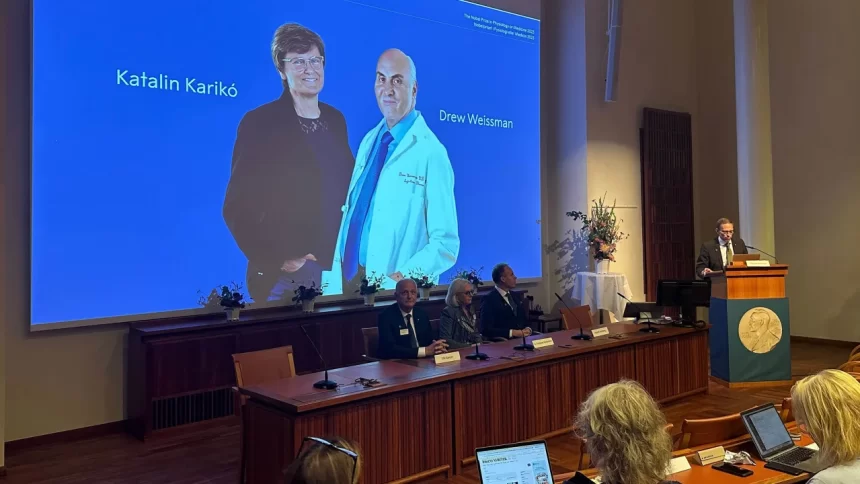CNN —
This year’s Nobel Prize in physiology or medicine has been awarded to Katalin Karikó and Drew Weissman for their work on mRNA vaccines, which were crucial in curtailing the spread of Covid-19.
The Nobel Prize committee announced the prestigious honor, seen as the pinnacle of scientific achievement, in Sweden on Monday.
It praised the scientists’ “groundbreaking findings,” which the committee said “fundamentally changed our understanding of how mRNA interacts with our immune system.”
Karikó and Weissman published their results in a 2005 paper that received little attention at the time, it said, but later laid the foundation for critically important developments that served humanity during the Covid pandemic.
“The laureates contributed to the unprecedented rate of vaccine development during one of the greatest threats to human health in modern times,” the committee added in a statement.
Rickard Sandberg, a member of the Nobel Prize in medicine committee, said “mRNA vaccines together with other Covid-19 vaccines have been administered over 13 billion times. Together they have saved millions of lives, prevented severe Covid-19, reduced the overall disease burden and enabled societies to open up again.”
Karikó, a Hungarian-American biochemist, and Weissman, an American physician, are both professors at the University of Pennsylvania. Their work became the foundation for Pfizer and its German-based partner BioNTech, as well as Moderna, to use a new approach to produce vaccines that use messenger RNA or mRNA.
Messenger RNA is a single strand of the genetic code that cells can “read” and use to make a protein. In the case of this vaccine, the mRNA instructs cells in the body to make the particular piece of the virus’s spike protein. Then the immune system sees it, recognizes it as foreign and is prepared to attack when actual infection occurs.
This design was chosen for a pandemic vaccine because it’s one that lends itself to quick turnaround. All that is needed is the genetic sequence of the virus causing the pandemic. Vaccine makers don’t even need the virus itself – just the sequence.
“The impressive flexibility and speed with which mRNA vaccines can be developed pave the way for using the new platform also for vaccines against other infectious diseases,” the Nobel committee said, adding that the technology “may also be used to deliver therapeutic proteins and treat some cancer types.”
J. Larry Jameson, executive vice president of UPenn’s School of Medicine, praised the scientists’ work which “changed the world.”
“During the biggest public health crisis of our lifetimes, vaccine developers relied upon the discoveries by Dr. Weissman and Dr. Karikó, which saved innumerable lives and paved a path out of the pandemic,” Jameson said in a statement. “More than 15 years after their visionary laboratory partnership, Kati and Drew have made an everlasting imprint on medicine.”
The Nobel Prize announcements began in Sweden Monday and will continue throughout this week and into next, with awards in physics, chemistry, literature and economics set to be announced in the coming days. The Nobel Peace Prize will be announced in Norway on Friday.










